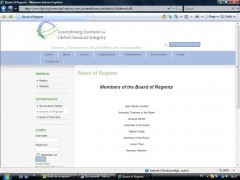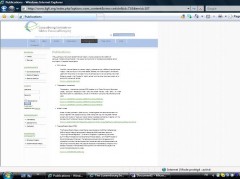10/24/2009
LIGFI snubs and disregards TJN and GFI
I have posted a couple of articles about LIGFI to observe it is an empty shell with a deceptive goal that was launched in a jurisdiction:
- where critics are repudiated (Cf. censorship of a report after pressure and threats),
- where regulation is perfectible because of the conflicts of interests and the direct say of professionals in the drawing up of laws and regulations that are applicable to them, which is practically an assent,
It is amazing to observe that 3 members out of 4 of the board of regents are both Luxembourgish and politicians (Jean-Claude Juncker, Jacques Santer and Lucien Thiel). The last member is Swiss.
LIGFI remains an empty shell despite the first articles are online on its website.
“What we all are missing are facts, rather than the continuous outflow of innuendos, unsubstantiated attacks and emotional outbreaks”, an article posted this week says.
Let’s see facts just on the LIGFI website to analyse the culture behind the project:
The “Publications” page starts with these words: The Luxembourg Institute for Global Financial Integrity will post publications that it deems of particular interest and significance in the support and promotion of professional excellence, ethics and integrity in the global financial sector.
And they list :
CFA Institute
The CFA Institute Centre for Market Integrity published so far in 2009 six Financial Market Integrity Index Surveys on the United States, Canada, the United Kingdom, Switzerland, Japan and Hong Kong. On a scale of one (not ethical at all) to five (very ethical), the United States is scored in the 2 range for “slightly ethical” and the other countries typically at or around 3 for “somewhat” ethical.
http://www.cfapubs.org/loi/ccb
Transparency International
Transparency International published 2009 updates to its Global Corruption Barometer (GCB), Corruption Perceptions Index (CPI) and Briber Payers Index (BPI). All three documents paint an unsatisfactory picture of the levels of corruption that prevail around the world.
http://www.transparency.org/policy_research/surveys_indices/gcb
http://www.transparency.org/policy_research/surveys_indices/cpi
http://www.transparency.org/policy_research/surveys_indices/bpi
Global Witness
Global Witness published in 2009 its study “Undue Diligence: How banks do business with corrupt regimes” that highlights corrupt funds finding their way into the global financial system and the lack of resolve of certain banks to address compliance in dealing with the sources of such funds given the lack or ambiguity of regulation and law.
http://www.globalwitness.org/media_library_detail.php/735/en/undue_diligence_how_banks_do_business_with_corrupt
Financial Stability Board (FSB)
The Financial Stability Board, whose Charter was endorsed by the G20 at the September 2009 Pittsburgh meeting, has published in September 2009 three recent reports on “Improving Financial Regulation”, “Overview of Progress in Implementing, the London Summit Recommendations for Strengthening Financial Stability”, and “FSB Principles for Sound Compensation Practices”. The reports are a forewarning to the regulatory and oversight environment that banking and other financial services worldwide can expect over the coming months and years. They capture the political will expressed by the G20 to firmly address the issues of financial behavior and systemic risk that are the root cause of the current financial and economic crises. http://www.financialstabilityboard.org/
Comments
1. They use an interesting report from the CFA Institute but in a biased perspective as the study focuses on big jurisdictions whereas many issues relating to money laundering tax evasion and/or fraud in a general rule are in small jurisdictions.
2. LIGFI write that Transparency International published 2009 updates to its Global Corruption Barometer (GCB), Corruption Perceptions Index (CPI) and Briber Payers Index (BPI). They ignore that the CPI no longer exists as I explained.
3. To be honest, they quote Global Witness that published a report that is critical for Luxembourg.
4. Finally, the Financial Stability Board, which is successor to the Financial Stability Forum, was established in April 2009 following the 2009 G-20. It comprises senior representatives of national financial authorities (central banks, regulatory and supervisory authorities and ministries of finance), international financial institutions, standard setting bodies, and committees of central bank experts. It is therefore vulnerable to “political games” like the OECD.
But above all, three major actors in the debate are missing in the list:
Global Financial Integrity. As the LIGFI team members live in the bowl they did not know that a body with similar title already exist since September 2006. Global Financial Integrity promotes national and multilateral policies, safeguards, and agreements aimed at curtailing the cross-border flow of illegal money. In putting forward solutions, facilitating strategic partnerships, and conducting groundbreaking research, GFI is leading the way in efforts to curtail illicit financial flows and enhance global development and security. This body has just completed a conference on “Increasing Transparency in Global Finance: A Development Imperative”.
Tax Justice Network promotes transparency in international finance and opposes secrecy. We support a level playing field on tax and we oppose loopholes and distortions in tax and regulation, and the abuses that flow from them. They promote tax compliance and they oppose tax evasion, tax avoidance, and all the mechanisms that enable owners and controllers of wealth to escape their responsibilities to the societies on which they and their wealth depend. Tax havens, or secrecy jurisdictions as we prefer to call them, lie at the centre of their concerns, and they oppose them. They just launched their website for the Mapping the Faultlines project (see www.secrecyjurisdictions.com), which explores the furtive world of secrecy jurisdictions where furtive types get up to all sorts of dubious business and another website (see www.financialsecrecyindex.com) which takes reader step-by-step into the details of their new ranking of secrecy jurisdictions. The ranking results will be published early November.
The Task Force on Financial Integrity and Economic Development is a consortium of Governments and NGOs that focuses on achieving greater transparency in the global financial system for the benefit of developing countries. It addresses the inequalities in the global financial system that penalize billions of people, and will advocate for greatly improved transparency and accountability
In a nutshell, according to LIGFI none of the above powerhouses in the debate - that proved reliable contrary to LIGFI - deems of particular interest and significance in the support and promotion of professional excellence, ethics and integrity in the global financial sector.
16:08 Posted in Luxembourg | Permalink | Comments (0)









The comments are closed.